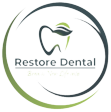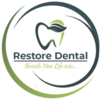
Children Dentistry
Children dentistry (Pediatric dental care) is a branch of dentistry dealing with children from birth through adolescence.
Pediatric dental care is important since it aids in the detection of early stages of tooth decay.
Early detection is essential to maintain oral health, modify aberent habits, and treat as needed and as simple as possible.
Additionally, parents are given a program of preventive home care (brushing/flossing/fluorides), a caries risk assessment, information on finger, thumb and pacifier habits.
Advice on preventing injuries to the mouth and teeth of children, diet councelling, and information on growth and development.
Also a record can be maintained of the developing teeth and the exfoliation pattern of the teeth.
Pediatric Fillings:
Pediatric fillings(restorations) as well as preventive care is given to the patients in order to prevent the decay and arrest the developed decay.
Pediatric Endodontics ( Root Canals):
Pediatric root canals (pediatric endodontics)is a speciality in itself dealing with the root canals of the milk teeth, in order to save the tooth so that it serves till the time the permanent tooth is erupted in the oral cavity of the child. To maintain space for the permanent tooth and also help in proper diet of the child by restoring this decayed milk tooth in proper form and function so that it helps the child in chewing.
Pediatric crowns
Pediatric crowns are mostly to restore the badly mutilated and decayed teeth in proper form, function and esthetics for them to serve well in the oral cavity of the child.
There are various crowns available for pediatric patients. Including the front and the back teeth.
Crowns may be tooth coloured (for front teeth mostly) or non tooth coloured (stainless-steel crowns for the back teeth).
Pediatric Teeth Cleaning And Oral Prophylaxis:
Pediatric tooth cleaning involves the same procedure of scaling and polishing as for the adult teeth, in order to remove the hard and soft tissue deposits and bio-films from the external tooth surface.
Also according to the need a fluoride varnish application protocol is followed for a patient with a high or moderate caries index, to decrease the decay activity.
Follow - Up Visits:
A proper diet control protocol in case of a patient with active caries will be generated which will be followed up every month or 3 months to prevent development of new cavities and to arrest the present cavities.
Monitoring the thumb sucking, nail biting habits includes in these follow-up visits.
Also includes the pattern of tooth eruption and exfoliation if in case any orthodontic care is needed at an earlier stage can be known by these visits.
Proper hygiene maintenance and guidance on a proper brushing and flossing technique will be moitored

